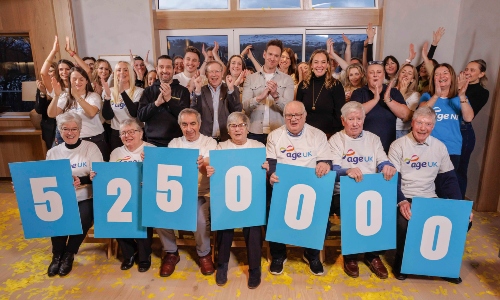This week, our friends at the Centre for Ageing Better launch ‘Age Without Limits’ – a new campaign to encourage us all to change the way we think about age and ageing.
Since starting my job as Chief Executive, I’ve been struck by our attitudes towards later life. It’s something we don’t want to talk about. We don’t really want to think about how we want to grow old, or what help and support we may need. We don’t want to think about finances, or health care. We might occasionally talk about retirement in a “when I’m finished, I’d like to live in a cottage by the sea” type of way, but not much beyond that. And most of us are uncomfortable thinking about death.
But could it be that our reluctance to talk about growing older is causing many of us to form negative ideas about ageing? Reframing how we think about later life is something the Age without Limits campaign, which we are proud to support, is hoping to address. By encouraging us all to talk and think differently about ageing, the movement wants to create a society that takes a more positive, inclusive approach to growing older.
Currently, the picture looks very different:
- Ageism is the most widespread form of discrimination in the UK*
- Half of people aged over 50 in England experienced age discrimination in the past year
- At least a third of people hold ageist beliefs
Ageism is often dismissed as being harmless, but research shows that ageist ideas or beliefs can be incredibly damaging for us as individuals and for wider society. They affect how we think and act, how we talk to older people and how we talk about them, and how we treat older people in our workplaces, communities and even in health settings.
We also internalise these negative ideas about ageing. They therefore become a self-fulfilling prophecy, affecting our self-esteem and what we think we are capable or worthy of as we get older.
Are you unintentionally ageist?
Most of us unwittingly hold ageist beliefs. Take Age Without Limits' quiz to find out if you do too.
And yet, it’s easy to underestimate the potential and value of older people – many of whom view age as just a number. Take 85-year-old Denise, for instance, who I met at Age UK West Sussex and told me she had come to volunteer “to look after the old people”. What an inspiration!
There are times in all our lives when we need the help and support of others. And times when we can be the helper and supporter. I know from my time at Mind how stigma around mental health prevented people from talking about it, seeking help, and getting recognition in workplaces and the political environment. Campaigns like this can have a huge impact, and it all starts with you and me.
What counts as ageism?
If you're concerned you've been discriminated against, we have information and advice that can help.






